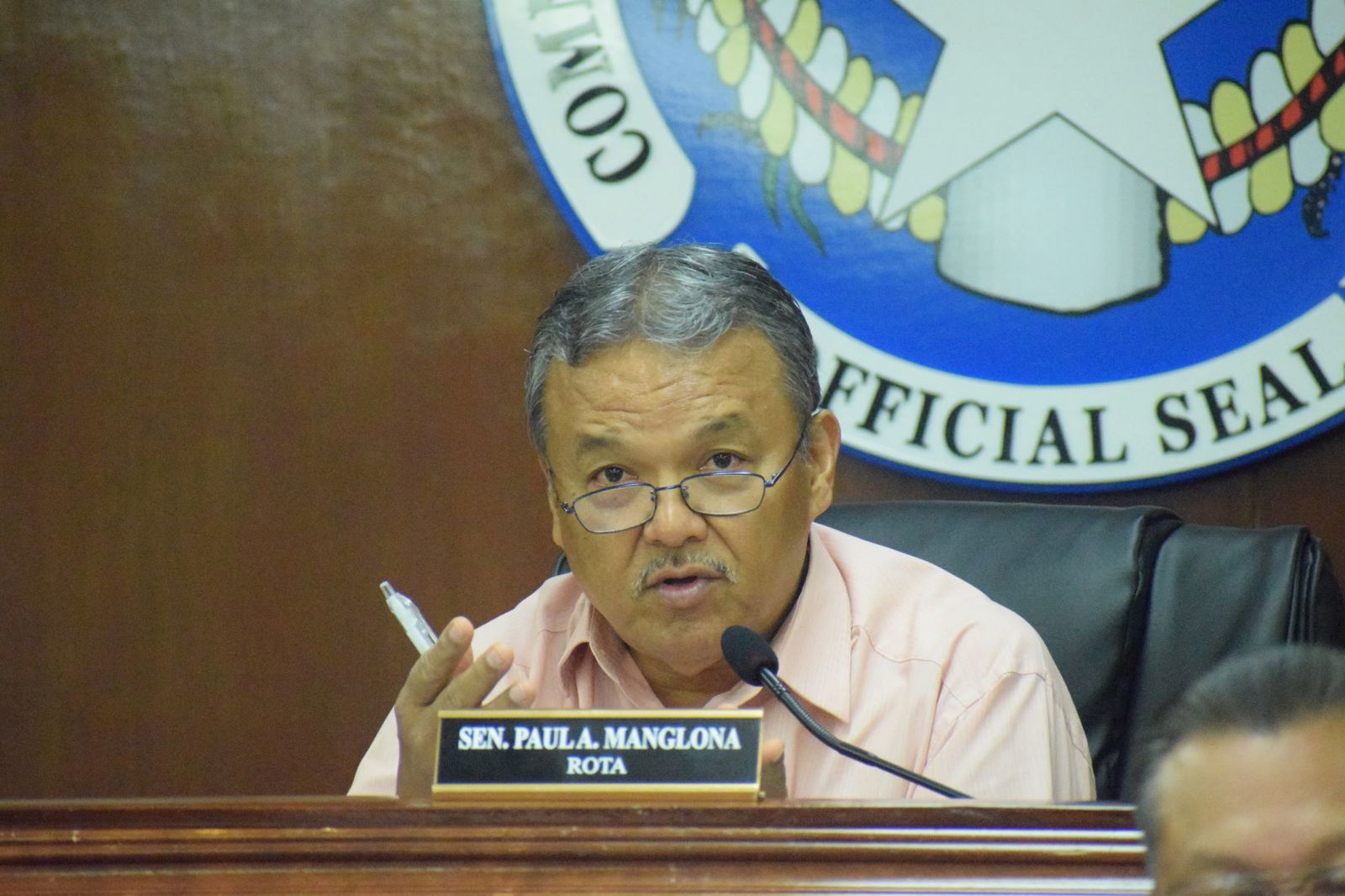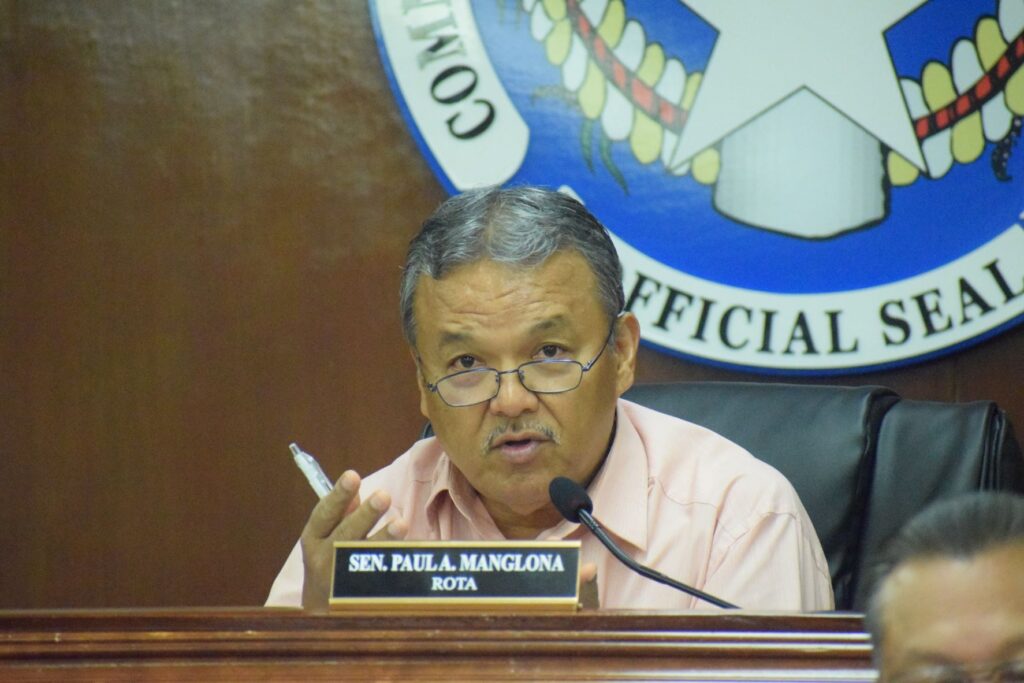
Paul A. Manglona
FOLLOWING the Department of Commerce’s official notification terminating Rota Terminal and Transfer Co., Inc.’s legal existence, the Commonwealth Ports Authority should terminate the company’s exclusive use of the Rota West Dock due to its failure to comply with many of the lease terms and agreements, Sen. Paul A. Manglona said.
In his letter to CPA Board Chairman Jose Ayuyu and Executive Director Leo Tudela, Manglona said he also supports the request of Seabridge Isla Shipping agent Pedro Q. Dela Cruz that CPA intervene and delay the implementation of the new tariffs pending review of the lease agreement between Rota Terminal and CPA.
The senator said Rota Terminal “is not in compliance with a majority of its lease agreement terms and conditions.”
“We need immediate action from CPA to terminate the exclusive use of the West Dock in Rota and allow other shipping companies to use the West Dock to provide affordable and reliable shipping and stevedoring services to the people of Rota,” Manglona told Ayuyu and Tudela.
Variety was unable to get a comment from Rota Terminal, which earlier said that it had filed a corporate report for the years 2018 and 2019.
Rota Terminal and CPA entered into a lease agreement in 1996, allowing the local stevedoring company exclusive use of the seaport for shipping and stevedoring operation. The annual rental fee was $50,000 per year plus 5% of the company’s gross revenue, Manglona said. In 2009, he added, the lease agreement was amended, replacing the annual rental fee plus 5% of gross revenues with a monthly rent of 50 cents per revenue ton transacted.
“Despite the advantageous amendments to the lease agreement in favor of Rota Terminal, which appeared to be intended to reduce the company’s cost,” Manglona said, “the shipping costs in Rota have been and continue to be excessively high compared to the shipping costs in Tinian and Saipan.”
He said it appears that any profit or savings realized by Rota Terminal since the amendment “have not been passed on to the consumers in Rota. Moreover, in the past 28 years or so of the lease, Rota Terminal appears to have repeatedly violated and failed to adhere to substantial terms, conditions or requirements of the 1996 lease agreement.”
According to the senator, Rota Terminal’s many possible violations of the 1996 lease agreement include:
⦁ Failure to file an annual corporation report since 2017.
⦁ Failure to obtain a business license since 2020.
⦁ Failure to maintain statements, accounts, books and records and provide copies to CPA upon demand.
⦁ Failure to file business gross revenue tax documents with the Department of Finance.
⦁ Failure to maintain employee records including Social Security and Medicaid payment contributions.
⦁ Failure to obtain and pay for all licenses and permits necessary for the conduct of its business including workers’ compensation.
⦁ Lack of casualty insurance coverage.
⦁ Failure to pay the $0.50 per revenue ton.
⦁ Failure to pay utility bills directly to the Commonwealth Utilities Corp.
⦁ Failure to use accurate shipping or weighing scales.
Manglona said “these are just a few terms and conditions of the 1996 lease agreement that Rota Terminal & Transfer has or may have violated.” This, he said, warrants review and investigation by CPA.
He also noted that under the lease agreement, CPA may enter the lease premises at any time during the term of the lease for the purpose of determining whether or not Rota Terminal is complying with the lease terms and conditions or any other purpose incidental to the rights of CPA.
Manglona said CPA “has an ethical and fiduciary responsibility to inspect Rota Terminal & Transfer’s books, records, and the lease premises to determine compliance with all lease terms, conditions, requirements and all CNMI laws and regulations.”
CPA, he added, also has a responsibility to ensure that Rota Terminal has the requisite liability insurance necessary to protect all of the parties involved in the lease.
He said CPA has the authority to exercise its right to terminate the lease if the company fails to pay rent due or cure any deficiencies within 30 days under Section 20.2 of the lease agreement.
“While I understand that CPA has to do its due diligence in reviewing and inspecting Rota Terminal & Transfer’s compliance with the 1996 lease agreement, the issues raised against RT&T in this letter are not new to CPA and must be addressed immediately. Moreover, unless Rota Terminal & Transfer complied with all the corporate and business license requirements and paid all fees and penalties accordingly as instructed by the Registrar of Corporations in her March 28, 2024, letter, RT&T is prohibited from doing business in Rota at this time,” the senator said.
Meantime, he said, “there is economic chaos on Rota…due to the lack of shipping services and affordable shipping tariffs.”
He said businesses and residents are suffering due to the limited and expensive shipping options in Rota.
CPA, he said, “must work with other shipping and stevedoring companies that are willing to immediately provide shipping and stevedoring services in Rota so there is no disruption in such services.”
“There are several companies in Saipan, Tinian and Guam that are willing to help the people of Rota, but Rota Terminal & Transfer’s exclusive use of the West Dock in Rota under the 1996 lease agreement prohibits any other company from using the West Dock to operate a shipping business,” Manglona said.
He added that the lease agreement “created a shipping monopoly that has price gouged the people since its inception. Instead of sharing the profits derived from the low-ball rental of $0.50 per revenue ton with the people of Rota, Rota Terminal & Transfer continued to charge excessive and unreasonable shipping tariffs that resulted in exceedingly expensive cost of goods and merchandise in Rota.”
“CPA has the chance to correct an egregious shipping monopoly that has strangled the economic progress and prosperity of the people and businesses of Rota,” Manglona said.











